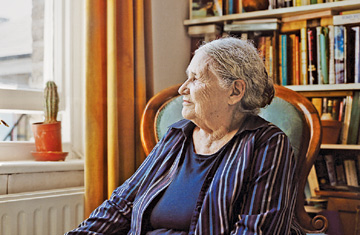
AT EASE: Lessing looks back on her parents' war-torn lives
In 1920s Rhodesia, leopards and snakes roamed the bush. Yet for 6-year-old Doris Lessing, this inhospitable environment offered a welcome refuge from her parents: Alfred, a soldier whose leg had been shattered by shrapnel in World War I, and Emily, a wartime nurse who helped to amputate it. Crouched in a patch of brush, Lessing would cover her ears and shout, "I won't listen," in an effort to drown out her parents' incessant talk of tanks, howitzers and death. "The trenches were as present to me as anything I actually saw around me," Lessing recalls in her riveting new book Alfred and Emily. "And here I still am, trying to get out from under that monstrous legacy, trying to get free."
Lessing's book, an account of her childhood on the frontlines of her parents' horrific memories, is an unusual work in two parts. The first half, a novella, imagines the lives her parents could have lived in England had the war never occurred; the second half, a memoir, recounts how their lives actually unfolded in their mud-brick farmhouse in Rhodesia. Together, they form a painful meditation on family and war, one in which the distance between dreams and reality is measured with disappointment. Lessing's life, we discover, falls in the chasm between them.
"The book emerged on my inner agenda without my planning it," says Lessing, sitting in the ramshackle North London home where she has lived for 25 years. In a career spanning six decades she has churned out nearly 50 books on an old-fashioned typewriter. But at 88, she insists that Alfred and Emily will be her last. Lessing says her energy has been sapped by ever-increasing burdens, such as taking care of her middle-aged diabetic son and dealing with the publicity she has faced since becoming the oldest recipient of the Nobel Prize for Literature last October. "When you're young you doubtless think that you're going to sail into a lovely lake of quietude and peace," she says. "This is profoundly untrue."
Frail and weary she may be, but Lessing still writes with the deftness and nuance that characterized her 1962 novel The Golden Notebook, one of the past century's most influential feminist works. In the memoir, she describes her father being lowered into a mine shaft, "his wooden leg sticking out and banging against its rocky sides," and reminisces about him hobbling over tree stumps and up hills to keep watch as she explored the veldt. In Alfred's imagined life, she makes him the successful farmer he wanted to be, and rids him of the diabetes that rendered him an invalid and eventually killed him. For good measure, says Lessing, she gave him "a nice, sexy wife, which he would have liked."
That sympathetic portrayal, which deletes Emily from his life, gives way to an unflattering portrait of her mother, whose "rough, unkind" hands Lessing loathed as a child. When the family arrived on the Rhodesian farm as part of a scheme to resettle white servicemen in the British colony, Emily anticipated getting rich off sales of maize and throwing fêtes with fellow settlers, only to learn that they were "solidly working-class Scots" with whom she had little in common. Haunted by flashbacks of soldiers dying without morphine, she had a nervous breakdown: "She called her children to her and said, 'Poor Mummy, poor, poor Mummy.' I was aged six and I hated her for it. This woman whimpering in her bed saying, Pity me, pity me."
Did the resentment dissipate? "No," Lessing says. "I can't remember a time I wasn't fighting her." In the book, she recounts their epic battles, including one triggered by a letter her mother wrote accusing her of being a prostitute. On another occasion, her mother phoned Lessing's employer and outed her as a member of the Communist Party. "She was a woman who shouldn't have had children, and she didn't in the life I have given her," Lessing says of the novella. "I'm hoping the fact that women can get jobs makes it impossible for this horrible person — the woman who has to live through her children — to come into existence."
Yet in parts of the book, Lessing softens and reveals her mother's capacity to care. As a former nurse, she brought ointments, stethoscopes and other implements to the village, turning their farmhouse into a makeshift hospital for local people.
With Lessing entering the twilight of her life, it's hard not to read Alfred and Emily as an act of atonement. Drawing on decades of hindsight, she accepts that her mother's war wounds, though less visible, ran as deep as her father's — and she endeavors to heal them. In the novella, she envisions her mother as what she could have been, a teacher and philanthropist, not the "demented" woman that war had made her. The memoir honors that potential, too. "The real Emily McVeagh was an educator, who told stories and brought me books," Lessing writes. "I owe to her, my mother, my introduction to books, reading — all that has been my life." In moments like this, Lessing sees past their tortured relationship and uses the literary gifts her mother gave her to pay, in posterity, a daughter's debt of gratitude.
